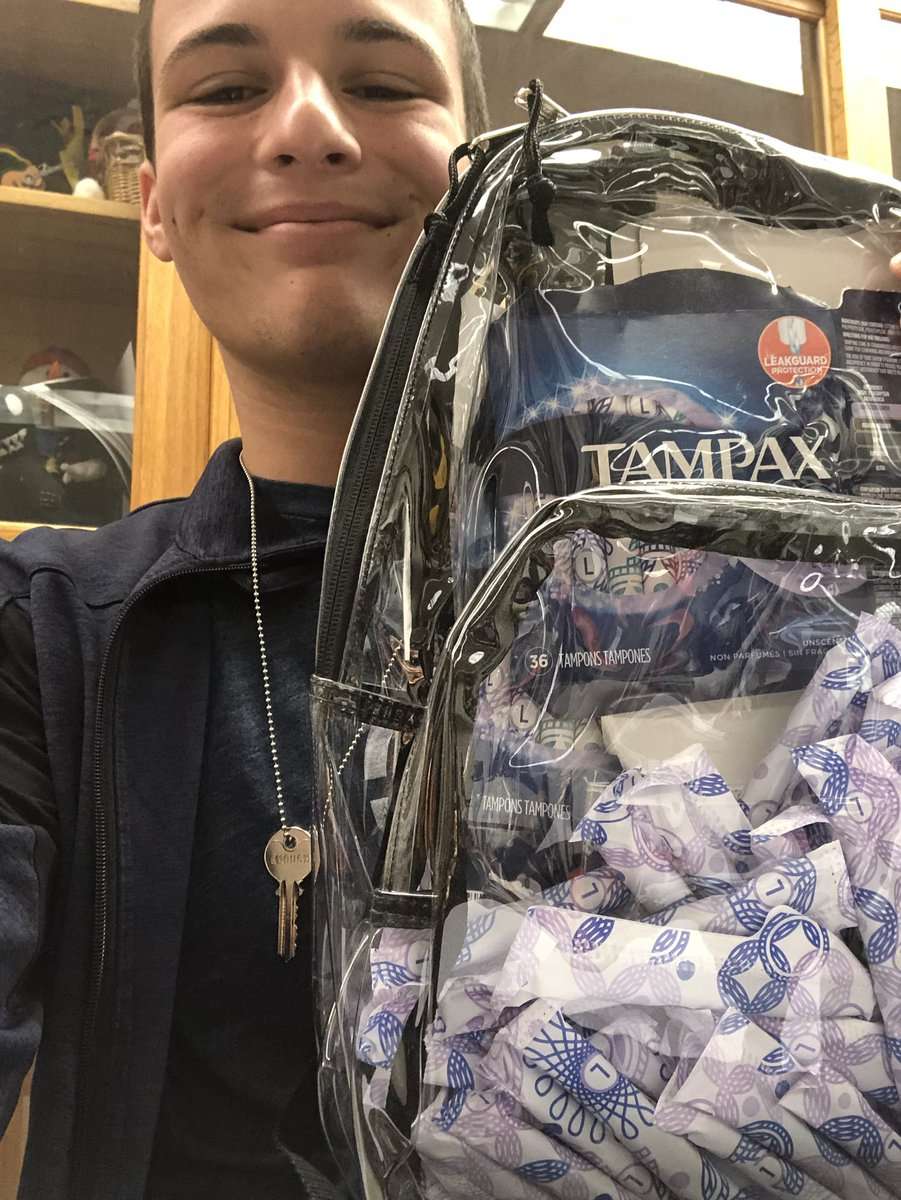Banning 'Assault Weapons' Makes As Much Sense As Banning Opaque Backpacks
The gun control policies student activists favor are just as dubious as the school security measures they mock.

Cameron Kasky is one of the most prominent student activists calling for gun control in response to the February 14 attack that killed 17 people at Marjory Stoneman Douglas High School in Parkland, Florida. Yesterday Kasky, a junior at the school, mocked the transparent backpacks now required there by filling one of them with tampons and posting a picture of it on Twitter, along with the tag #MSDStrong. Like "many Marjory Stoneman Douglas students behind the #NeverAgain movement" (per USA Today), Kasky seems to think the backpack policy is a dubious imposition that creates the appearance of doing something about gun violence without actually making people any safer. But as Robby Soave noted the other day, the policies favored by Kasky and his fellow activists are open to the same criticism.
"We are demanding an assault weapons ban," Kasky explained on Face the Nation after last month's "March for Our Lives" rally in Washington, D.C. "We are demanding the prohibition of sales of high-capacity magazines, and we are demanding universal background checks, which is something you'll see from the polls pretty much the entire country is behind and yet we've seen nothing of it." If the aim is reducing the frequency or lethality of mass shootings, these measures do not hold much more promise than MSD's see-through backpacks.
Assault weapons. The ban proposed by Sen. Dianne Feinstein (D-Calif.), which presumably is the legislation that Kasky has in mind, would not actually eliminate the guns it targets, since it exempts firearms legally owned prior to the bill's passage. (The alternative would be a mass confiscation campaign that would be practically and politically problematic, to put it mildly.) Based on data for production and imports since 1990, the National Shooting Sports Foundation estimates that Americans own more than 16 million rifles that would qualify as "assault weapons" (which the industry prefers to call "modern sporting rifles"). If grandfathered firearms undermined the effectiveness of the federal "assault weapon" ban that expired in 2004, that problem is more than 10 times as big today.
More to the point, the features that define so-called assault weapons—things like folding stocks and barrel shrouds—have little or nothing to do with their effectiveness in the hands of mass shooters. Contrary to popular belief, the guns that Feinstein wants to ban do not fire faster, fire more rounds, or fire larger-caliber bullets than the ones that would remain legal. Even if she could make all "assault weapons" magically disappear, would-be mass shooters would have plenty of equally lethal choices left.
High-capacity magazines. As with "assault weapons" (but more so), many millions of these are already in circulation and therefore would remain available to violent criminals. And given how quickly magazines can be switched, it is not clear that, say, forcing assailants to use magazines holding 10 rounds rather than 30, even if it were possible, would make a significant difference in attacks on unarmed people.
Consider the 2007 Virginia Tech attack, which killed almost twice as many people as the Parkland massacre. The perpetrator used ordinary handguns, as opposed to "assault weapons," and he had 19 magazines, some holding 10 rounds and some holding 15. He emptied 17 magazines before ending the rampage by shooting himself in the head.
Universal background checks. The Parkland shooter passed a background check because he did not have a disqualifying criminal or psychiatric record, as is typically true of mass shooters. In such cases, requiring background checks for all gun transfers (as opposed to sales by federally licensed dealers, as under current law) obviously would not stop murderers from obtaining weapons. Even when someone planning an attack is not legally allowed to buy guns, it is unlikely that a notional, unenforceable background check requirement for private transfers would foil him. The perpetrators of the 1999 attack at Columbine High School in Colorado, for instance, were both younger than 18 when they began acquiring their weapons, which they did illegally, through older third parties. If a background checks had been legally required for those secondary transfers, it would not have made a bit of difference.
My new backpack is almost as transparent as the NRA's agenda.
I feel sooo safe now.
As much as I appreciate the effort we as a country need to focus on the real issue instead of turning our schools into prisons. #clearbackpacks #MarchForOurLives pic.twitter.com/HqBIeGjzF9
— Lauren Hogg (@lauren_hoggs) April 2, 2018
We cannot say for sure, of course, that none of these measures would make a difference, just as we cannot say for sure that mandating clear backpacks at Kasky's school won't save any lives. But it both cases, it seems quite unlikely.
"My new backpack is almost as transparent as the NRA's agenda," MSD freshman Lauren Hogg, the younger sister of gun control activist David Hogg, tweeted on Monday. "I feel sooo safe now. As much as I appreciate the effort we as a country need to focus on the real issue instead of turning our schools into prisons."
I agree that turning schools into prisons makes little sense, especially given the rarity of the crimes that administrators are trying to prevent. But I don't see how phony, feel-safe gun controls are any more "real" than phony, feel-safe school security measures.


Show Comments (156)